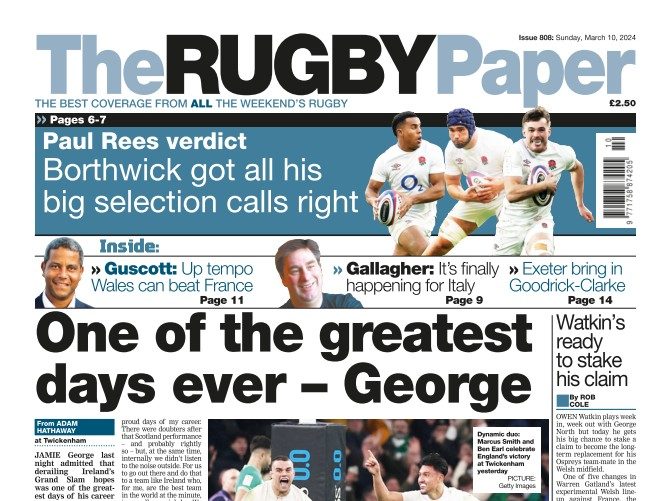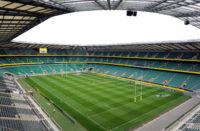Following three occurrences in the first round of games, all sell-outs on Seatsnet at this year's Rugby World Cup, the use of the head-on-head contact rules in rugby union is again in the limelight.
Three minutes into their game, England saw a player receive a red card for the fourth time this season when Tom Curry was dismissed for a head-on collision with Argentina full-back Juan Cruz Mallia.
In Chile's match against Japan, Martin Sigren received only a yellow card for an apparent similar incident. In contrast, Jack Dempsey's apparent collision with Jesse Kriel in the opening minute of Scotland's match against South Africa went unpunished.
Law 9 of the Rugby Union Laws prohibits head-to-head contact during a tackle, which also addresses foul play. According to Law 9.11, “Players must not do anything reckless or dangerous to others,” the referee is always authorised to show a player a yellow or red card for any infractions of that rule.
The global governing body's head contact decision-making process for officials stipulates that the player's conduct must have been deliberate, careless, and avoidable to determine what foul play occurred in a head-on collision.
If there was a sudden or significant change in the ball carrier's height or direction, a late change in dynamics brought on by contact from another player, and the tackler made an effort to get their arms around the ball carrier, mitigation in the form of issuing a red or yellow card as a sanction in addition to a penalty may be applied.
Curry's dismissal and Chile's captain Sigren's sin-binning both fell beneath the jurisdiction of the Bunker review system, which was implemented for this World Cup to give a Foul Play Review Official (FPRO) more time to rule on incidents where a red card is not an immediate and obvious punishment.
Each time, the Television Match Official flagged the original incident to the on-field referee; Mathieu Raynal and Nic Berry issued yellow cards after watching replays on the big screen and crossing their arms to indicate that a Bunker review would also be conducted.
After a player is sent to the sin bin, the FPRO has up to eight minutes to consider the judgement carefully and determine whether the foul play calls for a red card. If not, the player can leave the sin-bin when their allotted 10 minutes have passed.
Later, it was communicated that Tom Curry's actions were worthy of a red card, which was subsequently issued while the England flanker was on the sidelines. However, Sunday's incident saw Chile scrum-half Sigren escape without further punishment, and he could return.
Naturally, the game situation between England and Scotland sparked much discussion and debate among ex-players and coaches.
Lawrence Dallaglio, a broadcaster for ITV and the England World Cup champion from 2003, concurred that Curry's head-on collision with Mallia deserved a yellow card but not a red one.
“Tom Curry stands his ground, and I think Mallia descends from quite a height, so I think he should have been allowed back on the pitch,” said Curry. It's a very, very difficult, debatable choice.
Sir Clive Woodward, a fellow studio commentator, expressed a similar viewpoint, and the World Cup-winning head coach elaborated in his Mail On Sunday daily column.
What I refer to as a “rugby incident” was when Curry collided head-on with Juan Cruz Mallia, according to Woodward. The sport is in jeopardy if such incidents are considered severe enough to get a red card.
“I honestly have no idea what Curry was expected to do to avoid finding himself in that predicament. A yellow card should have been issued. Curry's behaviour was neither malicious nor planned.
However, former Wales international Andrew Coombs said a red was appropriate given that World Rugby has toughened its punishments for high tackles to reduce the risk of player head injuries.
“Dallaglio and Woodward are showing they are stuck in an alternate era with their half-time assessment regarding the Curry red card,” Coombs said on Facebook.
“I genuinely feel bad for Curry, but player safety always comes first, and this situation called for a red card. The tackle is not malicious; it just needs to be lowered.
John Barclay, a former Scotland international, expressed his surprise that the TMO did not step in when Kriel and Dempsey looked to collide on Sunday.
Barclay told ITV, “It's a red card.” He approaches from a distance, has a clean line of sight, stands straight up, and exerts force head-on.
Scotland manager Gregor Townsend and England head coach Steve Borthwick would comment extensively on the situations in their respective matches.
When questioned about Curry's red card, who will have an in-person disciplinary hearing on Tuesday evening, Borthwick responded, “Each situation is different. We'll scrutinise it.
“It will now go through a disciplinary process, and I shouldn't start commenting about it,” the speaker said.
On the other hand, Townsend expressed disappointment that the TMO did not step in and bemoaned the inconsistent application of the head contract law.
From two screens away, it appeared to be a head-on collision, and Townsend expected the TMO to enter the scene and inform the referee of this.
We are annoyed by the fact that there are still discrepancies in how we perceive these things, but our performance is what truly frustrates us.
All Blacks annihilate on opening day by hosts
For a sell-out game on Seatsnet, the All Blacks, who have won the Webb-Ellis Cup three times, were thrashed by Les Bleus on Friday night in front of a packed Stade de France. Winger Damian Penaud and backup full-back Melvyn Jaminet scored in the second half to give France its historic 27-13 triumph.
The eagerly awaited Rugby World Cup kickoff is finally here. Seven rugby world cups have seen matches between Les Bleus and the All Blacks. The confrontations have been intriguing, entertaining, and — depending on who you support — devastating despite historic New Zealand dominance. The triumph for France on Friday night was typical.
In a World Cup pool match, Antoine Dupont's team overcame the All Blacks and handed them their first-ever defeat.
In a dominant 27-13 victory at Stade de France in Saint-Denis, which was a complete sell-out on Seatsnet, a suburb of Paris, winger Damian Penaud and backup full-back Melvyn Jaminet scored touchdowns in the second half.
After a closely contested first half, New Zealand's lack of discipline gave the French the advantage. The All Blacks gave up excessive penalties, which Thomas Ramo could score numerous times throughout the game. The French full-back's renowned right-foot accuracy was used to score 17 of France's points.
The 10th Rugby World Cup's opening ceremony was, well, French. The performance began with Oscar-winning actor Jean Dujardin handing baguettes to some of France's most well-known figures while cycling through a set decorated in a 1950s motif.
Fireworks lit up the sky above the packed stadium after some Edith Piaf, a flying beret, the Eiffel Tower, and some outstanding gymnastics.
As they rushed onto the pitch, nothing separated France and New Zealand, ranked third and fourth in the world.
Following their 40-25 victory over New Zealand at the same venue at the end of 2021, Les Bleus might be confident in their ability to complete the task. But since then, the All Blacks have gotten back into shape. Until their biggest-ever defeat on August 25 at the hands of the Springboks of South Africa at Twickenham, New Zealand had won 11 successive games.
The All Blacks got off to a slow start, which tipped the scales. It was revealed that the men in black had lost their captain, Sam Cane, to injury just as French President Emmanuel Macron kicked off the game. Ardie Savea assumed control.
But things changed for the better astonishingly soon. Left winger Mark Telea scored in the corner in the second minute after centre Reiko Ioane made a clean line break, followed by flyhalf Beauden Barett's accurate cross-field kick.
It took some time for the World Cup jitters to calm down following the shock of the early try. Neither team could keep the ball for more than a few phases in the first few stages, but France benefited from some early penalties, which would become a recurring theme throughout the game. Ramos gave France its first lead with his second penalty in the 20th minute.
Following their successful defence against an All Blacks assault at the end of the first half, France entered the locker rooms with a one-point lead, 9-8.
New Zealand's Telea scored a try in the corner to start the second half virtually precisely the same as the first. Reiko Ioane's pass to Telea pitched before reaching him, but it was evident in the replay that it had moved forward, even if the officials missed it in real time.
The incident was reminiscent of the 2007 quarterfinal when French full-back Damien Traille illegally passed the ball forward to Freddie Michalak without being penalised, which resulted in Michalak scoring the game-winning try against the All Blacks. They probably would have applauded the poetic justice if New Zealand had won the match.
The French maintained their lead, and Penaud was granted what he had been refused moments earlier. In the 56th minute, he tapped in the corner undisturbed after a deft series of passes for France's first try. Ramos scored from the corner, giving France a 16-13 advantage.
The All Blacks' problems grew worse from that point on. Will Jordan, a full-back for New Zealand, received a yellow card and a 10-minute suspension for dangerously contesting a high kick.
The final nail in the coffin was Jaminet's 79th-minute try, which followed a superb kick by Antoine Dupont's substitute Maxime Lucu. This came after two more Ramos penalties.
With Rugby World Cup action heating up in France, with the hosts too emerging favourites to retain the silverware in their homeland, tickets are beginning to sell out on Seatsnet. You can now source your tickets reliably.

























